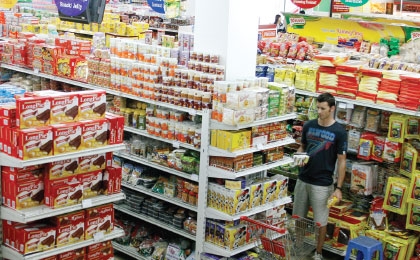Three pillars set to stabilise momentum
 |
| The prices of many consumer goods are expected to head north by the year’s end |
According to a government report on Vietnam’s socio-economic development in 2010 and 2011, submitted to the National Assembly Standing Committee’s eighth session, Vietnam’s preceded tasks in 2011 will be to continue stabilising the country’s macro economy, bridling inflation and maintaining economic growth at 7-7.5 per cent against 2010.
The gross domestic product (GDP) is expected to reach $112.8-$113.8 billion next year, when per capita GDP will be $1,290-$1,300.
It is expected that the country’s total exports next year will be $74.8 billion, up 10 per cent against 2010.
The Government Office’s Minister and Chairman Nguyen Xuan Phuc said stabilising the macro economy was needed as it was the foundation for not only ensuring 2011’s economic growth, but also for higher future economic growth.
According to a National Assembly’s Economic Committee report, over the past nine months, the country’s macro economy remained unstable, while the quality of growth was low. This could badly affect the country’s development in the next years.
For example, the trade deficit in 2010 is estimated to increase by 5 per cent against 2009 and occupy over 22 per cent of the country’s total export turnover.
Moreover, the economic growth quality, which is an important target for Vietnam’s socio-economic development plan for 2010, had not improved. For example, there was a continued decline in the coefficient between country’s industrial added value and industrial production value, with 0.62 in 2008, 0.53 in 2009 and an expected 0.43 per cent this year.
According to the government, the country’s consumer price index (CPI) is expected to be less than 8 per cent in 2010 and less than 7 per cent in 2011. However, the Economic Committee chairman Ha Van Hien said that the CPI developments had been unstable since early this year. Specifically, the monthly CPI increased on average by 1.35 per cent in the year’s first quarter, in which February’s CPI augmented by 1.96 per cent against January. The CPI reduced by 0.21 per cent per month during the year’s second quarter and rebounded by 0.53 per cent per month on average during the third quarter of the year. However, it increased by 1.31 per cent per month in September against August.
“This has badly influenced the public and made it very difficult for enterprises’ production and business and for local policy-makers to devise policies,” Hien said.
Nguyen Sy Dung, deputy chairman of the National Assembly’s Office, said the government needed to keep a sharp eye on the market price developments to take timely measures to contain inflation, a factor greatly impacting economic growth.
Hien said there were also other problems able to harm the country’s economic growth. For instance, state expenditure remained high, equal to 5.95 per cent of GDP, while the government debt in 2010 was expected to account for 52 per cent of GDP.
What the stars mean:
★ Poor ★ ★ Promising ★★★ Good ★★★★ Very good ★★★★★ Exceptional
Related Contents
Latest News
More News
- Cashless payments hit 28 times GDP in 2025 (February 04, 2026 | 18:09)
- SSIAM and DBJ launch Japan Vietnam Capital Fund (February 04, 2026 | 15:57)
- Banks target stronger profits, credit growth in 2026 (February 04, 2026 | 15:43)
- Vietnam on path to investment-grade rating (February 03, 2026 | 13:07)
- Consumer finance sector posts sharp profit growth (February 03, 2026 | 13:05)
- Insurance market building the next chapter of protection (February 02, 2026 | 11:16)
- NAB Innovation Centre underscores Vietnam’s appeal for tech investment (January 30, 2026 | 11:16)
- Vietnam strengthens public debt management with World Bank and IMF (January 30, 2026 | 11:00)
- Corporate bond market poised for stronger growth cycle (January 28, 2026 | 17:13)
- Vietnam's IPO market on recovery trajectory (January 28, 2026 | 17:04)

 Tag:
Tag:



















 Mobile Version
Mobile Version